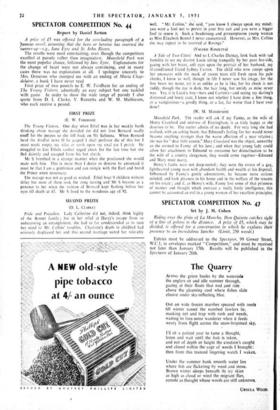SPECTATOR COMPETITION No. 44
Report by Daniel Parson
A prize of £5 was offered for the concluding paragraph of a amous novel, assuming that the hero or heroine has married the runner-up—e.g., June Eyre and Sr. John Rivers.
The results were most entertaining, even though the competitors excelled at parody rather than imagination. Mansfield Park was the most popular choice, followed by Jane Eyre. Explanations for the change of heart were not always convincing, and in many cases there was no explanation at all. I apologise sincerely to MTS. Ormeron who stumped me with an ending of Maria Chap- delaine, a book I have never read First prize of two pounds to E. W. Fordham for an ending of The Young Visiters, admittedly an easy subject but one tackled with gusto In order to show the wide range of parody I also quote from D. L. Clarke, V. Ranzetta and W. M. Mathieson, who each receive a pound.
FIRST PRIZE (E. W. FOREMAN) The Young Visiters. One day when Ethel was in her weakly barth thinking about manage she deccided she did not love Bernard madly cnuff for the purpus so she fell back on Mr Salteena. When Bernard herd the dredful news 0 he gasped I shall perforce die of this but I must needs empty my viles or north upon my rival ere I perish. He struggled to kiss Ethcls randier ruged cheek for the last time but she fled daintily and escaped from his hot clutch.
Mr S breethed in a strange manner when she proclamed she would mate with him. This is more than I desire or deserve he anounced it must be that I am a gentleman and can mingle with the Earl and beerd the Prince when nessessary.
The manage was not as good as wished. Ethel boar 9 children without delay but most of them took the rong turning and Mr S became as a penance to her when the vishion of Bernard kept flashing before her eyes till death at 47. Mr S lived to the wondrous age of 92.
SECOND PRIZES (D. L. CLARKE) Pride and Prejudice. Lady Catherine did not, indeed, think highly of the Bennet family ; but in her relief at Darcy's escape from so unbecoming an entanglement, she had so far condescended as to turn her mind to Mr. Collins' troubles. Charlotte's death in childbed had seriously displeased her and this second marriage suited her tolerably
well. " Mr. Collins," she said, " you know I always speak my mind: you were a fool not to persist in your first suit and you were a bigger fool to renew it. Such a headstrong and presumptuous young woman as Miss Elizabeth Bennet I never encountered. However, as Mrs. Collins she may expect to be received at Rosings."
(VALERIE RANZETTA)
A Tale of Two Cities.' And so I, Charles Darnay, look back with sad humility to see my dearest Lucie sitting tranquilly by her poor fire-side, gazing with her brave, soft eyes upon the portrait of her husband, my ill-conditioned friend Sydney Carton. The child who now creeps upon her unawares with the mark of recent tears still fresh upon his pale cheeks, I know so well, though in life I never saw his image, for the boy bears my name, yet is as unlike as he is like, for his cheek is not ruddy, though the eye is dark, the hair long, but untidy as mine never was. Yes, it is Lucie's boy—hers and Carton's—and seeing my darling's distressed and lowly stale, I know not whether I have done a fine thing, or a vainglorious—a goodly thing, or a far, far worse than I have ever done!
(W. M. MATIIIESON) Mansfield Park. The reader will ask if my Fanny, as the wife of Henry Crawford and mistress of Everingham, is as truly happy as she deserves to be. The matter admits of no doubt. For very long she had realised, with an aching heart, that Edmund's feeling for her would never become anything stronger than the warm affectiojn of a near relative; she was his "dear little cousin," Mary Crawford was the object, unworthy as she seemed to Fanny of his love ; and when that young lady could allow her attachment to Edmund to overcome her disinclination to be the wife of a country clergyman, they would come together—Edmund and Mary must marry.
Henry's faults were not deep-rooted ; they were the errors of a gay, lighthearted young man with abundant health and wealth at his disposal. Influenced by Fanny's gentle admonitions, he became more serious minded, and took pleasure in his home and in the welfare of the tenants on his estate ; and if. as‘Henry's wife, Fanny lost some of that primness of manner and thought which overcast a really lively intelligence, this cannot be accounted an evil in a young woman of her excellent principles.






































 Previous page
Previous page